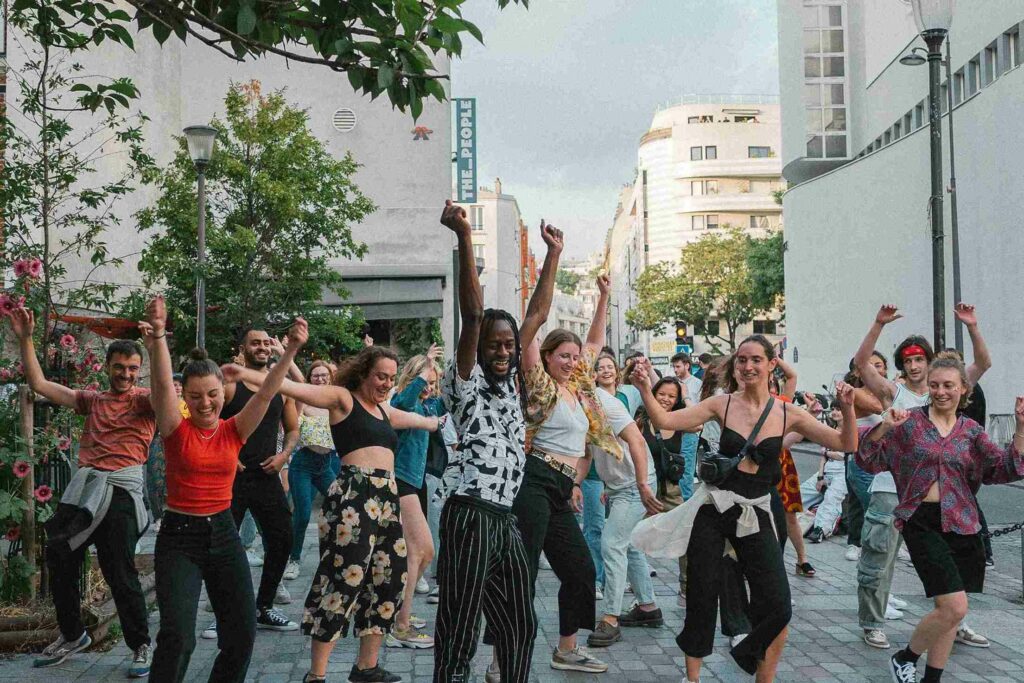In a time when division and exclusion are all too common, whether rooted in social, racial or cultural differences, Pauline Terestchenko sees dance as a way to bridge those gaps and bring people together. As the founder and co-director of S.W.A.G. Studio in Paris, she has built more than just a dance space — she’s created a thriving community, 5,000 strong, where urban dance helps dismantle social barriers.
A 2019 graduate of the ESCP’s Master in Management programme, Pauline Terestchenko views dance as a universal language that unites people, no matter their background. “For us, dance isn’t about competition or performance. It’s a social experience that fosters empathy and joy between people from all walks of life,” she explains.
“S.W.A.G. Studio has a double mission: to integrate refugee dancers and to democratise urban dance, in order to create bonds between people who are not alike,” adds the female entrepreneur. This includes creating opportunities for beginners who might feel intimidated by traditional dance classes, as well as vulnerable groups like people with disabilities.
For us, dance isn’t about competition or performance. It’s a social experience that fosters empathy and joy between people from all walks of life.
From exclusion to inclusion
Pauline Terestchenko’s own path to entrepreneurship in the dance scene was anything but typical. “I am not a dancer,” she admits. “I was raised in a family where we weren’t allowed to dance because it was considered obscene. We were expected to read books and remain silent.”
When she first encountered dance at 22, she felt a mix of excitement and unease. She was captivated by it, but the competitive nature and the quick pace of the classes left her feeling out of place.
Around the same time, she met several refugee artists who had relocated to France. Despite their incredible talent, she says many of them faced racism and exclusion in the dance community. This, along with her own feelings of exclusion, sparked an idea: “I just wondered if dance could not be a way to break exclusion, to connect everyone together,” she recalls. “When you dance, you don’t need to speak the same language, you don’t need to look alike. You just dance.”
That’s when the vision for S.W.A.G. Studio began to take shape, a place where refugee dancers could build careers while also helping beginners find their footing as well.
Building a community
Like many entrepreneurs, Pauline Terestchenko started small but with a strong sense of purpose. Her first major step was joining the Blue Factory startup incubator at ESCP in Paris. Becoming part of a community of entrepreneurs gave her the confidence and support she needed to take the next steps.
In just a few months, things took off. After joining the incubator in September 2020, she officially launched S.W.A.G. in January 2021. Later that year, the first studio opened its doors, and her business partner, Chloé Louisin, joined to help drive the project forward. Since then, S.W.A.G. has continued to grow and expand.
Today, Pauline Terestchenko and Chloé Louisin run a thriving business with two locations — one in Paris and another in Marseille. Their team has 19 members including 14 dancers coming from Mali, Ukraine, Russia, Madagascar, Namibia and Mexico. Together, they’ve built a wider community of more than 5,000 people who support the studio’s mission.
And this growth has been entirely organic, without external investment—something Pauline Terestchenko takes great pride in. “I wouldn’t have done anything differently. At every stage, I did it by myself, I learned, then improved,” she recalls.
When you dance, you don’t need to speak the same language, you don’t need to look alike. You just dance.
A mission rooted in inclusion
At the heart of S.W.A.G. is a simple yet powerful mission: to use dance as a tool for creating a more inclusive society. This commitment goes beyond the dance studios’ walls. Every year, the organisation hosts S.W.A.G. Outside, a festival in Paris’s Belleville neighbourhood. More than just a celebration of dance, Pauline Terestchenko says the event serves as a platform for promoting equal rights and fostering unity through movement.
And she stresses that the festival, like the studio itself, is powered by its community: “We imagined it, organised it and financed it ourselves,” she says. “Our community naturally wants to help support our commitment.”
Lessons for aspiring entrepreneurs
Looking back on her journey, Pauline Terestchenko has plenty of advice for others looking to break into the dance or wider sports industry. First and foremost, she stresses the importance of supporting the people you work with, particularly in industries where artists often face financial challenges.
“Serve the needs of the people you employ, highlight their talents, and pay them well,” she advises, adding that equitable pay is crucial for building a sustainable business. And for any entrepreneur, she believes that passion is crucial. “The rest will come along,” she says.
For her, S.W.A.G. is more than a business; it’s a platform for social change. It’s where movement unites people and breaks down barriers. Through her venture, she’s building community and pushing for a more inclusive world, all powered by dance.
